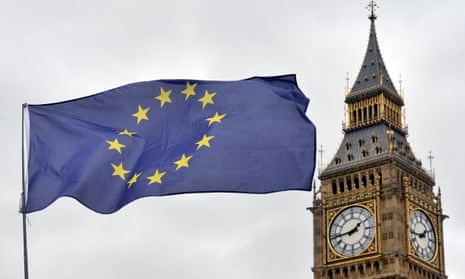The EU has dismissed Theresa May’s vision for a post-Brexit trade relationship, laying out instead the offer of a more limited deal, as it warned that Brexit would make life “more complicated and costly” for both sides.
Unveiling the union’s guidelines on the future relationship, the president of the European council, Donald Tusk, said it was “simply not in our interests” to give way to the prime minister’s “pick and mix” approach.
“I fully understand and respect Theresa May’s political objectives to demonstrate at any price that Brexit will be a success and was the right choice”, he said. “I’m sorry, this is not our objective.”
“No member state is free to pick only those sectors of the single market it likes, nor to accept the role of the ECJ only when it suits their interest. By the same token, a pick-and-mix approach for a non-member state is out of the question.”
Speaking during a visit to Luxembourg, Tusk responded to May’s Mansion House speech, where the prime minister said she would leave the single market, customs union and jurisdiction of the European court of justice: “Therefore, it should come as no surprise that the only remaining possible model is a free trade agreement.”
But the EU offered a life raft to Jeremy Corbyn and others looking for a softer Brexit, saying “the union will be prepared to reconsider its offer” if UK positions were to evolve. The Labour leader last week called for the UK to remain in a customs union with the EU. But the EU’s “evolution clause” is set to expire in October, the deadline for both sides to agree terms on an outline future deal.
The guidelines say that in return for tariff-free access on goods, the British government will have to accept existing reciprocal rights on fishing - a demand that is bound to anger Brexiters that campaigned to “take back control” of British waters.
The guidelines also say that due to the UK’s red lines there will need to be “checks and controls” and “this unfortunately will have negative economic consequences”.
The free-trade agreement would be underpinned by a UK commitment not to become a low-tax, low-regulation state that undercuts the EU model. The EU is making bigger demands on the UK than other countries because of the size and proximity of the British economy.
“We need something more robust simply because of the nature of the UK economy and of course to the repeated references in the UK debate to competing with the union with lowering standards,” said a senior EU official, welcoming the fact the UK government had recently changed tack on this point.
They further warn that Brussels will not push on with negotiations on trade until May signs up to a legal text that translates all the commitments made by the UK government in the first phase of negotiations, including on avoiding a hard border on the island of Ireland.
Tusk said: “Our agreement will not make trade between the UK and the EU frictionless or smoother. It will make it more complicated and costly than today, for all of us. This is the essence of Brexit.”
May’s official spokesman said: “This is a draft text that has not been formally published and that has been circulated to the EU27 for comment. We look forward to seeing the final guidelines when published, and hope they will provide the flexibility to allow the EU to think creatively and imaginatively about our future economic partnership.”
Crucially, the EU text does not mention financial services or May’s preferred option of mutual recognition, where both sides open their markets by agreeing their regulations are equally good.
A senior EU official said that was one of “a number of nebulous concepts” in May’s speech, adding that the EU still saw “remaining contradictions” in the UK position. Some of the speech “sounds to us like single market lite or customs union lite and we don’t think it can work.”
But the official said UK associate membership of EU agencies had not been ruled out, although what that means is yet to be defined. The EU guidelines ruled out third-country membership. May asked for British membership of EU agencies on medicine, chemicals and aviation, to give business the security it demands.
Despite these difficulties, Tusk insisted his guidelines showed that the bloc “doesn’t want to build a wall between the EU and Britain”.
Under the guidelines, which need to be negotiated between the 27 member states ahead of an EU summit at the end of the month, the UK would be offered a deal:
- ensuring zero-tariffs on goods in exchange for the UK maintaining existing EU access to British waters.
- delivers a customs arrangement to minimise barriers to trade, but with “rules of origin” checks and other controls on the borders.
- a limited deal on services that takes EU free-trade agreements with Canada as a model.
- an aviation accord “to ensure connectivity” between the UK and Europe, but is likely to fall short of British hopes for UK airlines to have the same rights in EU markets.
- participation in European programmes on research, education and culture in return for payments into the EU budget.
The EU also spelt out it wanted a close security agreement in “light of the geographic proximity and shared threats faced by the union and the UK”, and “in the fields of security, defence and foreign policy there should be no gap in the EU-UK cooperation as a consequence of the UK withdrawal from the union”, the guidelines stipulate.
The prime minister of Luxembourg, Xavier Bettel, who joined Tusk for a press conference, said he backed the guidelines but hinted at a debate to come among the 27 member states on financial services. He agreed there could be “no cherry picking” but said some sectors would need a “differentiated approach”.
